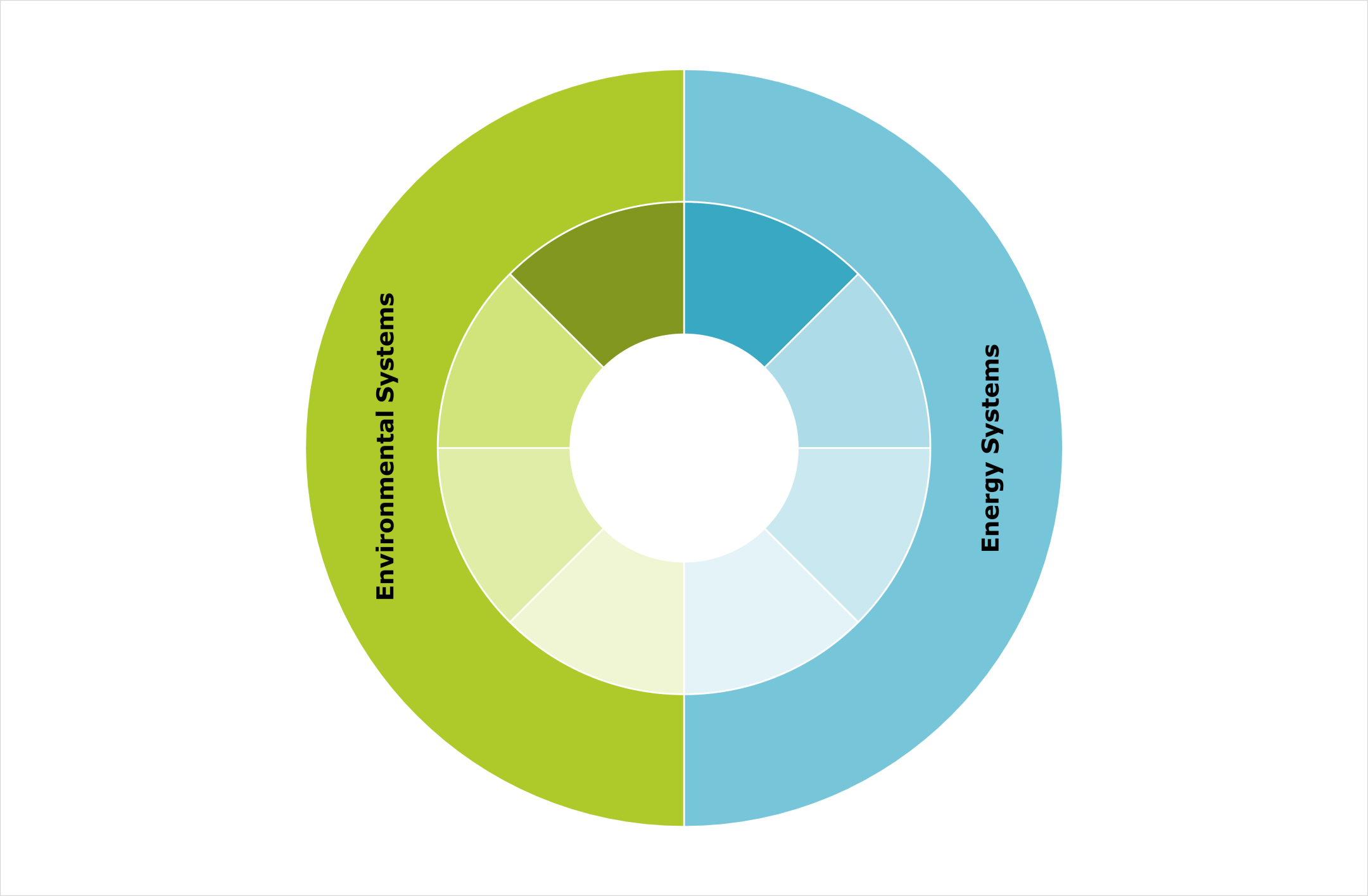Explore our Specializations
Click on the colored segments to get more information about the modules
Specialization
In order to develop a systemic understanding,
the program offers students two selectable
specializations with a range of well-alligned
modules.
For more information about the specializations and modules, click on the segements

Specialization Environmental Systems
The growth of population and its needs require a more sustainable management of resources and waste to preserve nature and the health and welfare of human beings. The global sustainable development goals require holistic and systemic solutions along the entire value chain, addressing resource extraction, processing, use, re-use, recycling, and disposal
Modules
- Water Management and Treatment
- Air Pollution Control
- Waste Management and Recycling
- Environmental Law and Regulations
Environmental Law and Regulations
Energy and environmental systems are governed by numerous laws and regulations that serve the protection of the environment. This course covers the areas of environmental law that are most relevant for energy and environmental systems engineers, including, inter alia, air pollution, land use, water protection and climate law. Students will gain an appreciation of the legal framework’s importance for their future work. They will understand the basic structure of international, European and Swiss environmental law. They will be able to discuss legal cases with peers and understand basic legal reasoning
Specialization Energy Systems
The intermittent and decentralized availability of energy from various renewable sources requires suitable storage and power grids. Combined with the fast advancement of digitalization, smart networks and fast communication, this enables the emergence of new business models governed by local and global policies.
Modules
- Energy Storage Systems
- Electrical Power Grids
- Renewable Energies – Solar and/or Bioenergy
- Energy Trading, Economics and Policies
Waste Management and Recycling
Introduction to waste management and waste categories, thermal treatment of municipal and industrial waste, sewage sludge and hazardous waste. The module deals with the final disposal, sorting and separation techniques of waste and discusses the technical fundamentals of recycling, alternative processes for thermal waste treatment and current trends/developments. In addition, laboratory exercises and excursions are carried out
Air Pollution Control
Understanding the formation and release of emissions, extend and corresponding effects of emissions, transmissions and immersions of individual pollutants, knowing and applying air pollution control technologies, classification of gas treatment processes and defining their area of application.
Water Management and Treatment
Introduction to drinking- and waste water systems and infrastructure, waste water constituents and water quality assessment, municipal and industrial waste water treatment, techniques of waste water treatment, rainwater and drinking water treatment processes, knowledge of planning and design of drinking- and waste water engineering processes, water / grey water re-use. In addition, laboratory exercises and excursions are carried out.
Energy Trading, Economics and Policies
Examine structures and trends of trading renewable energies as opposed to trading “grey” energies as commodity, trading CO2 certificates and related products, innovations in this area, political guidelines, and their international ramifications
Renewable Energies
Bioenergy
The technologies for energy from biomass are presented with focus on combustion in residential and industrial applications for heat, combined heat and power (CHP), and dedicated power. Further, biofuels production by anaerobic digestion (biogas), fermentation (bioethanol) and synthesis are discussed. For relevant applications, investment costs are described and economic assessments of bioenergy production are discussed.
Solar Energy
Imparting of physical fundamentals and technologies regarding the usage of solar energy. Along with solar heat in buildings also photovoltaics and concentrated solar thermal processes to generate electricity are discussed. Furthermore, planning fundamentals and commercial planning software as well as costs and profitability are part of the module.
Electrical Power Grids
The following topics are covered: Transformation of primary into electrical energy. Fundamentals of the main grid components of a power system (generators, transformers, substation and transmission lines/ cables). Grid analysis techniques such as load-flow and short-circuit calculation. Methods of power system control. Analysis of blackouts and concepts of protection systems
Energy Storage Systems
Principles of energy supply, with a focus on renewable energies. Importance, application and overview of energy storage. Planning and use of modern energy storage. Storage of thermal energy: Fundamentals of thermodynamics, exergy analysis and interpretation, modeling and application, thermal energy networks. Storage of electrical energy: fundamentals of electrical storage, analysis and interpretation. Modeling and applications and electrical networks. Combined use of thermal and electrical energy storage in networks and interplay of forms of energy (Power to Gas, Power to Heat, electro-thermal energy storage). Accompanying laboratory exercises on current topics in energy storage technology
